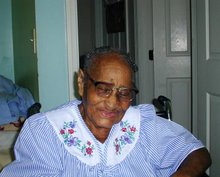Tips For Caregiver's
People with Alzheimer's disease frequently become more disoriented after dark or when waking. Leaving a night-light on in the bedroom may be helpful.
~WebMd
~WebMd
Sunday, September 7, 2008
Become An Advocate
As part of their advocacy and awareness initiatives for World Alzheimer's Day (September 21, 2008) the Alzheimer's Association is recruiting 50,000 new advocates through a special action. Help this recruitment effort by asking your friends and family to sign the Alzheimer's Association Proclamation to the next President! The signatures of these new advocates supporting Alzheimer care and research will be delivered to the new president in January. Here is the Proclamation url - please pass it on: http://www.alz.kintera.org/proclamation.
Subscribe to:
Post Comments (Atom)
.jpg)








2 comments:
Alzheimer's Disease : Signs & Symptoms
As people grow older, they face dealing with an onslaught of diseases and disorders related to advancing age. Alzheimer's disease is one of the many diseases that concern seniors. It is the most common form of dementia and it affects the parts of the brain that control memory, thought, and language skills. Unfortunately doctors do not know what causes Alzheimer's and there is no known cure. Early detection is very important as it gives doctors the best chance to treat the symptoms of this disease. So what are the symptoms?
Forgetfulness is generally the first sign that a person may have Alzheimer's. This symptom occurs in stages and is the main symptom of Alzheimer's. It starts with forgetting minor things like where you put the car keys or the remote control for your television. A person will forget recent events in their lives such as attending a birthday party or watching a movie. Usually this type of forgetfulness will seem like a nuisance but is usually not enough to cause serious concern. As Alzheimer's progresses, a person's forgetfulness will begin to affect their daily lives and will signal that a person needs medical attention. They will begin to forget how to do simple, daily tasks and may fail to recognize family and friends.
In the middle and late stages of Alzheimer's disease, a person's ability to think clearly is affected. They may also lose the ability to speak, understand, read, or write. Because of the effects of the disease, a person may become distressed and aggressive. People with Alzheimer's also have a tendency to wander away from home causing them to need around the clock care.
By being proactive and aware of these signs and symptoms, you can help yourself or your loved one lead a normal life for as long as possible. Available treatments can help to delay a person's mental deterioration. Use this symptoms checklist to assess whether or not you or a loved one may need to seek medical attention.
Home Health Senior Care
My dad has had alzheimer's for the pas 4 years. He has hit a stage of aggression. He has been in and out of hospitals and nursing homes. We are finding out now that none will take him because of his aggression issues. He is now in another hospital trying to figure out his medicine doses, he has been in the hospital for a month now and they still can not get his medicines under control for aggression. I simply find it hard to believe that none else has had this aggression problem with alzheimer's before. It just is very frustrating for my mom and the family to keep finding places only to have them say they will not take him because of this problem. Were are all the other people with this same problem were do they put them.
Sorry I just had to vent. I hope someone else is in this same boat and can shed some light.
Post a Comment